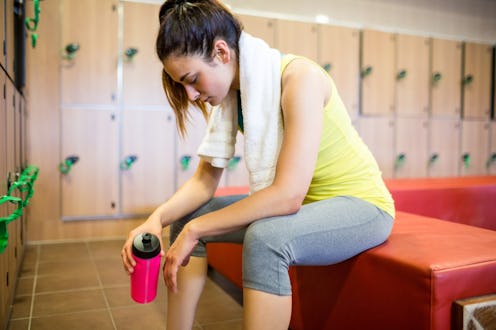Life
This Is What Happens If You Don't Wear Shower Shoes At The Gym, According To A Doctor

If you've ever been in a rush to get a sweat session done before work, or to pack your gym bag half-awake in the morning, you've probably forgotten an item or two. Sure, forgetting your water bottle or headphones is probably NBD, but what if you forget your shower shoes? Is hitting the locker room barefoot, even once, a good idea? If you don't wear shower shoes at the gym, medical experts say there are a number of infections and unwanted health issues you could contract.
Charles Gerba, Ph.D., a microbiology professor at the University of Arizona, who also conducts research for Zoono GermFree24 Hand Sanitizer, tells Bustle that gyms tend to be "hotspot" for germs and infection to thrive. As SELF reported in 2016, a study conducted by FitRated found that most gym equipment has more bacteria on it than a toilet seat (ew). Moreover, the gym locker room is no exception: The study revealed gym faucet and shower handles also tested positive for harmful bacterias that cause everything from the flu to food poisoning.
If that's what lurks on surfaces at the gym, just imagine what's on the floor, and what you can contract if you don't wear shower shoes. "Naked feet are especially prone to fungal disease especially in the shower and bathroom stalls [at the gym]," Dr. Gerba says, adding that this can include plantar warts and athlete’s foot. According to the Mayo Clinic, plantar warts are small, rough growths that will show up on the bottom of your feet, and are caused by a few strains of HPV. Though they are common and typically go away with over-the-counter treatment (or none at all), plantar warts can cause some people pain.
Athlete's foot is another common fungal infection that Healthline reports "isn’t serious, but sometimes it’s hard to cure." Some of the symptoms include itchy, scaly, or painful skin, blisters, swelling, and rashes between the toes. In some cases, it can spread to your toenails (and even your hands!) if not treated. Luckily, like plantar warts, there's a wealth of prescribed and over-the-counter medications doctors can recommend for athlete's foot.
However, foot fungi is the least of your worries if you hit the locker room showers shoe-free, because there's also a chance you could catch a dangerous staph infection. Dr. Gerba explains, "MRSA, or 'Methicillin-resistant Staphylococcus aureus,' a type of staph infection that is resistant to commonly used antibiotics, is a bacterium that causes infections in different parts of the body and is often found in close quarters like gyms, especially in the shower stalls."
According to the CDC, MRSA can lead to skin problems, pneumonia, a high fever, and even sepsis. Furthermore, this infection is possibly fatal if untreated. MRSA on your foot may look like pimples at first, but eventually, these bumps will swell into large abscesses. "Symptoms of this infection can be mild, but also extremely painful," says Dr. Gerba, adding that, "While not typical, on occasion it can get into the bloodstream, and make people very sick."
By and large, bringing your shower shoes to the gym every single time you plan to rinse off after your workout is definitely the best practice for your health. Dr. Gerba strongly suggests "to wear shoes in the shower that can also be disinfected after each use" if you want to be sure to avoid possible infection to the best of your ability. Sure, there's always a chance you could contract an infection from the locker room showers. But, shower shoes are one of your safest bets for staying healthy and happy at the gym.